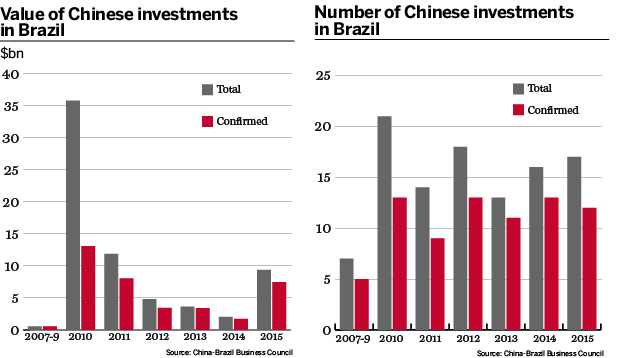The relationship between Brazil and China is a highly complementary one. Historically based on the trade of natural resources, the two countries now see eye to eye when it comes to investment too. Brazil has large infrastructure needs that are still largely unmet while China has large levels of capital seeking investment opportunities.
Following years of Chinese loans to the Brazilian government and its state-owned companies, this match was solidified by the recent official launch of a $20bn Brazil-China Cooperation Fund dedicated to infrastructure investment in Latin America’s biggest economy, to which Beijing will contribute $15bn.
The special relationship is also exemplified by the resurgence of individual Chinese investments in Brazil. These peaked in 2010 with a total of $13.09bn between acquisitions and greenfield projects, according to the Rio de Janeiro-based China-Brazil Business Council. When adding initiatives that had been announced but did not materialise in the same year, the number reached $35.79bn.
Energy demands
Investments from China to Brazil subsequently declined until 2015, when they spiked again to a value of $7.45bn, the most recently available aggregate figure. The energy sector has been a big driver of this, while Chinese banks’ more moderate but growing interest rates help to frame Beijing’s commitment to assisting corporate clients in Brazil.
Of the total 2015 figure, including announcements and actual investments, more than 80% went to the energy sector: $7.76bn was earmarked for energy projects, including renewable energy, out of a total $9.38bn. The world’s largest hydroelectric power producer, China Three Gorges (CTG), was particularly active that year with the successful bid for two power plant concessions, the acquisition of three others and a minority investment in an additional plant, all coming to a total of $4.62bn.
The company established a presence in Brazil only in 2013, but expanded further in 2016, with the $1.2bn acquisition of Duke Energy’s Brazilian operations. China’s other energy heavyweight investors are State Grid and Shangdong Electric Power Construction Corporation.
Financial ventures
In the financial services sector, Bank of Communications joined China Construction Bank (CCB) in acquiring Brazilian lenders. It bought BBM in 2015, following CCB’s acquisition of BicBanco in 2013. Bank of China and Industrial and Commercial Bank of China also have a presence in Brazil, as does China Development Bank.
Additionally in 2015, China Communications Construction Company formed a partnership with Banco Modal and Australian specialist investor Macquarie Capital to create a $500m infrastructure and logistics fund to invest in the Latin American country and elsewhere in the region.
As Brazil seeks to curb its worryingly high public spending, and improve transport and energy connections, China’s increased interest in its economic activities will provide much-needed relief. Zhang Guanghua, vice-president at Bank of China Brazil and president of the Brazilian Association of Chinese Companies, says: “The growth of Chinese investment keeps the world strong. China discovered Brazil late but caught up with lost time over the past years.”













